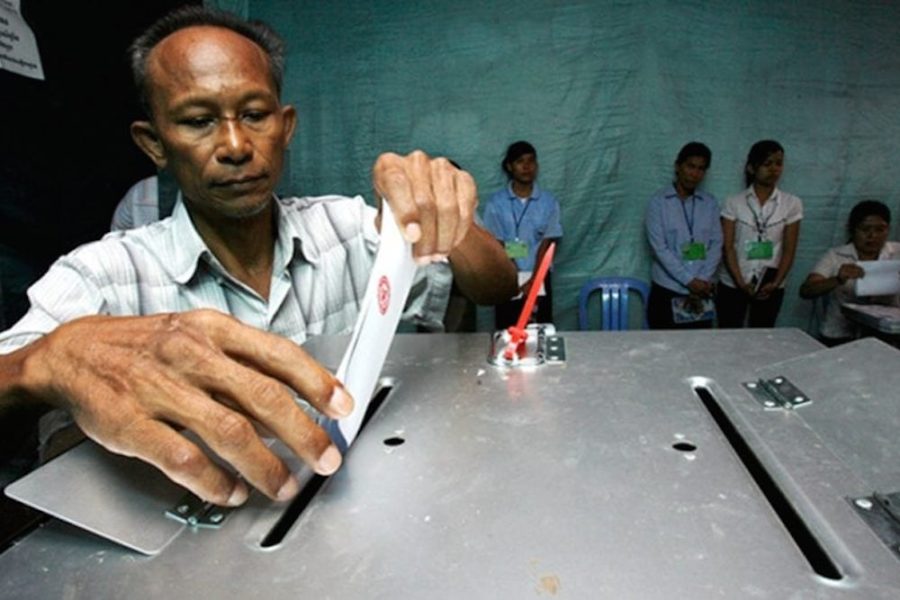A joint statement issued this morning by 85 NGOs, local community groups, trade unions and political observers called on citizens to “join forces” over a recent deterioration in Cambodia’s human rights environment.
The statement said there had been a decline in the government’s respect of human rights and democracy since the dissolution of the opposition Cambodia National Rescue Party (CNRP) in November 2017, and warned the country could face “sanctions, insecurity and instability” if the situation continued.
“Cambodia’s history has shown that the lack of mechanisms of free and fair elections brought harrowing suffering, family separations and deaths to the Cambodian people during the Cold War,” it said. Cambodia suffered for years under regimes ascended to power by military coup, mass deaths during the Khmer Rouge era, and ensuing civil wars.
“The governance and development of the country without regard to human rights and genuine democracy can lead Cambodia to descend into the same tragedy as in the past,” the statement said.
The 85 signatories included prominent NGOs such as the Committee for Free and Fair Elections in Cambodia (Comfrel); labor groups including tuk-tuk drivers’ association IDEA and NagaWorld union LRSU; 43 farmers communities and community groups; and political commentators Meas Nee and Lao Mong Hay.
“We call upon all leaders, civil servants, stakeholders, and Cambodian citizens of all political tendencies, who are masters of the nation’s destiny, to join forces to protect and uplift the spirit of the Paris Peace Accords and the Constitution of the Kingdom of Cambodia,” the statement said, referring to the 1991 agreement restoring democracy to Cambodia.
Some of the groups that joined the statement have themselves been targeted during the political crackdown; Comfrel was named as one of the groups supporting the opposition in a 132-page government screed released last year detailing supposed color revolutionary plots.
A separate joint statement released over the weekend, meanwhile, said at least 140 former members of the CNRP had now been summoned for questioning by police and the courts since late April.
Dozens have been interrogated at the Battambang Provincial Court; dozens more questioned by local police in Kompong Thom; and many others also targeted across the country.
“The recent surge in legal actions taken against former CNRP members illustrates the serious and systematic misuse of laws to target, intimidate and harass individuals for merely exercising their fundamental freedoms,” said the weekend statement, which had 73 signatories including rights groups Licadho and the Cambodian Center for Human Rights.
“We urge the Royal Government of Cambodia to immediately cease the harassment of members of the political opposition and instead take concrete measures to restore civic space and enable all individuals to exercise their rights to free expression, association, assembly and political participation.”
According to Human Rights Watch, which released its own statement condemning the political harassment this afternoon, 36 summonses were issued in Battambang province, 36 in Kandal, 35 in Kampong Thom, 14 in Phnom Penh, eight in Banteay Meanchey, six in Kompong Speu, six in Kampot, four in Kampong Chhnang, and two in Pursat.
All summonses seen by the New York-based rights group contained only vague references to the ex-CNRP members supposedly violating the Supreme Court order that dissolved the main opposition party and forced much of its senior leadership to seek refuge overseas, it said. Former opposition leader Kem Sokha remains in house arrest in Phnom Penh.
“How many more dissidents need to be jailed or forced into exile before the international community acts to defend human rights and democracy in Cambodia?” said Brad Adams, Human Rights Watch’s Asia director.
The statements issued by civil society groups are believed to have coincided with the arrival in Cambodia of a delegation from the E.U. to investigate a possible suspension of the duty-free Everything But Arms trade scheme.
The government has been defiant amid mounting criticism, including as the E.U. and U.S. review their trade deals with Cambodia.
In March, Prime Minister Hun Sen ordered local authorities to pursue a policy of “see one, beat one” when it came to political gatherings by the former CNRP. Last month, police chief Neth Savoeun called on officers to be on the lookout for any “color revolutionary attempts” and be prepared to stamp them out.
And last week, ruling party spokesman Sok Eysan praised one-party rule, saying countries with more parties “always have nonstop quarrels,” while one-party rule in China and Vietnam had achieved competitive levels of development.
On Monday, Eysan said the civil society groups were being overly dramatic — and their ability to issue critical statements was proof of their freedoms.
If the democratic space were as constricted as they alleged, “all those 85 civil society groups, or the earlier 73, wouldn’t be able to criticize or attack the government in Cambodia according to their political biases,” Eysan said.
“If there were serious human right violations, people absolutely would rise up against the government, and the country would not enjoy political stability under the a strong umbrella of peace.”
(Updated at 2:20 p.m. with Human Rights Watch statement)
(Updated at 4:30 p.m. with CPP spokesman Sok Eysan’s response)












